The Communist Manifesto: Understanding and Analyzing Key Concepts
VerifiedAdded on 2020/05/16
|6
|1056
|95
Essay
AI Summary
This essay provides an in-depth analysis of Karl Marx and Friedrich Engels' The Communist Manifesto, examining its core arguments and historical context. The essay begins by exploring Marx's critique of the bourgeoisie and its mode of production, highlighting how capitalism compels nations to adopt its system. It then delves into the concept of class struggle, the role of the proletariat, and the inherent contradictions within capitalism that ultimately lead to its downfall. The analysis considers the impact of industrialization, nationalism, and the dehumanizing effects of the division of labor. The essay concludes by summarizing the key themes and their relevance in the modern world, drawing on the text's enduring influence on political thought and social movements. The document uses references from the original text to support its arguments.
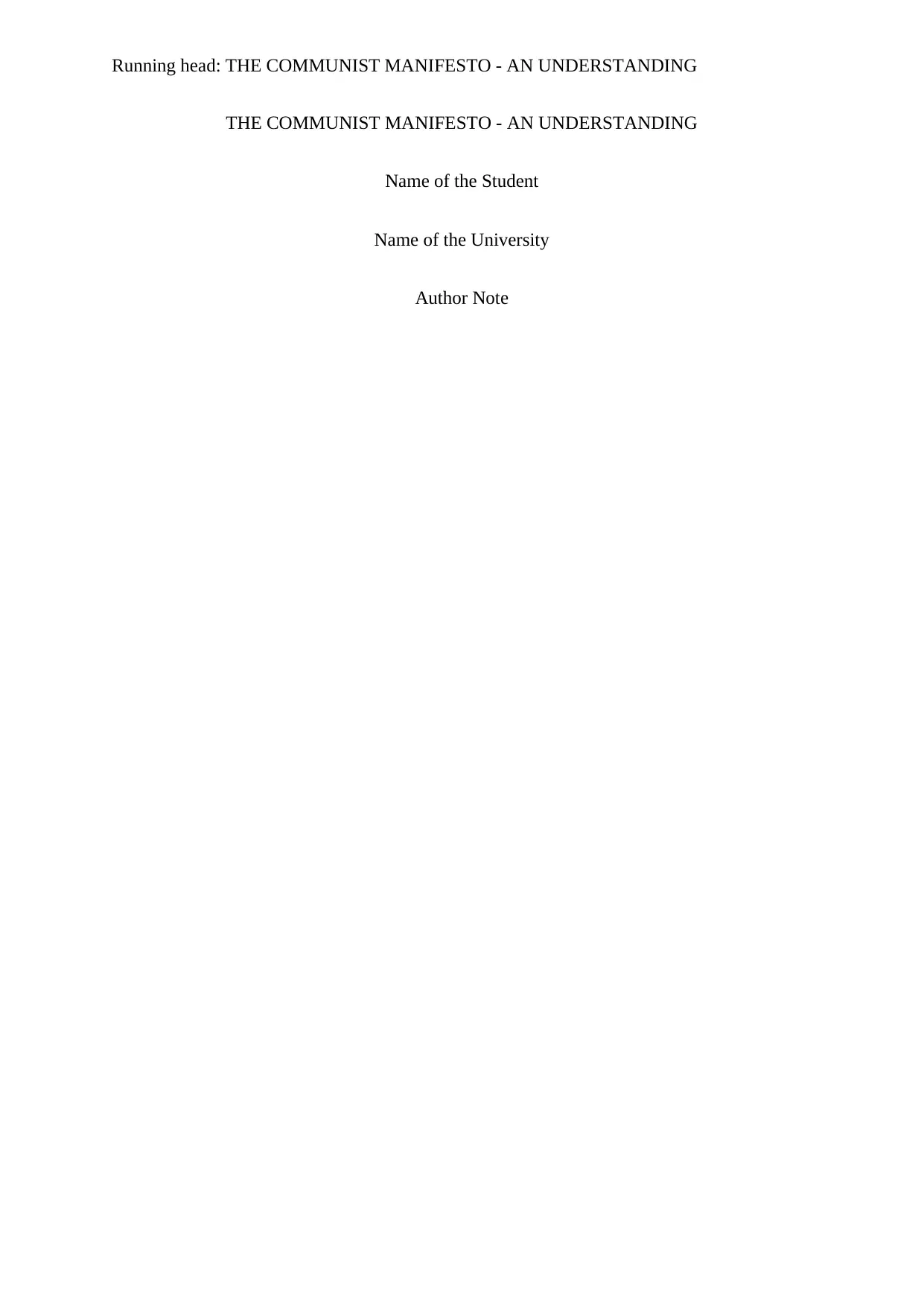
Running head: THE COMMUNIST MANIFESTO - AN UNDERSTANDING
THE COMMUNIST MANIFESTO - AN UNDERSTANDING
Name of the Student
Name of the University
Author Note
THE COMMUNIST MANIFESTO - AN UNDERSTANDING
Name of the Student
Name of the University
Author Note
Paraphrase This Document
Need a fresh take? Get an instant paraphrase of this document with our AI Paraphraser
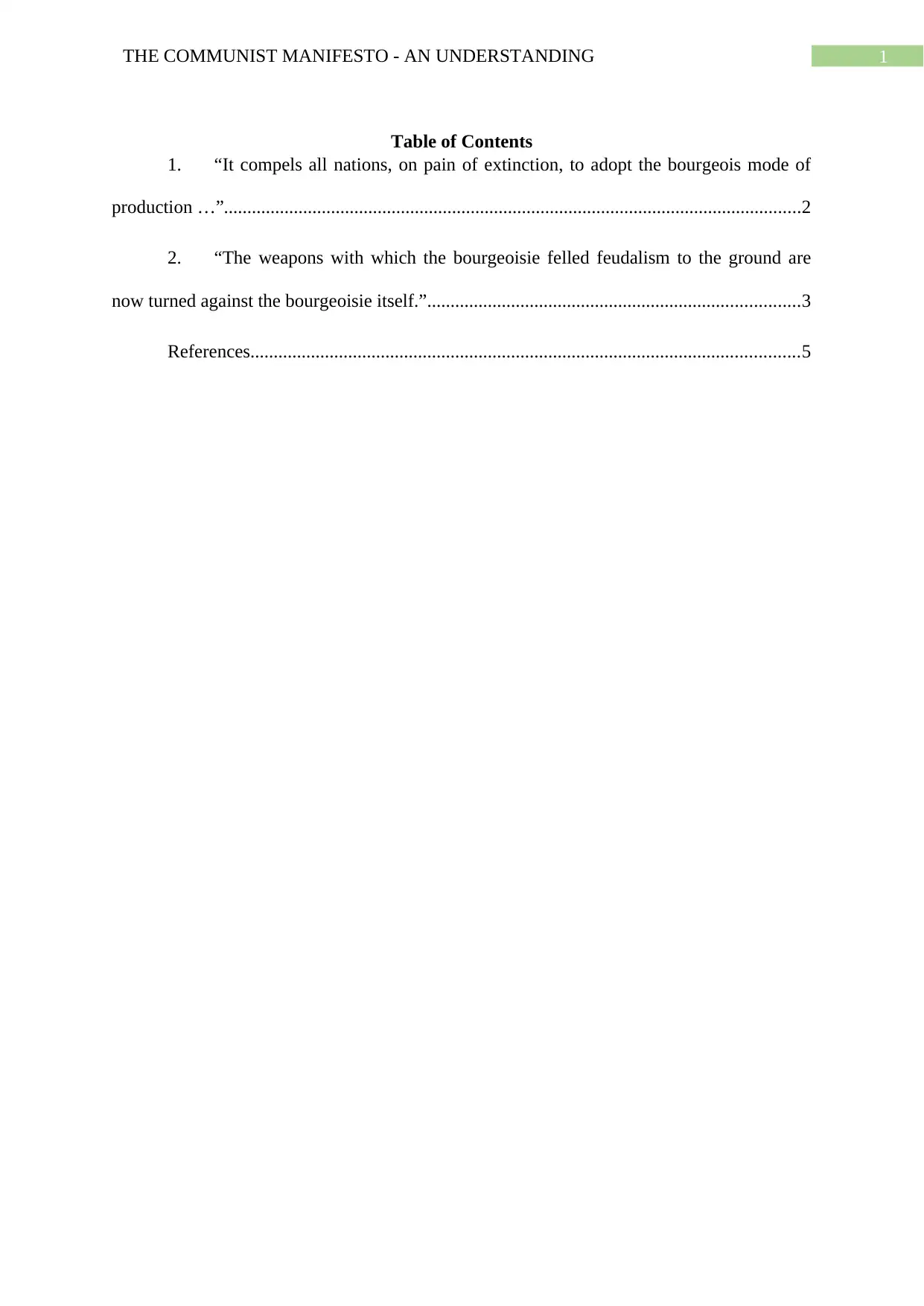
1THE COMMUNIST MANIFESTO - AN UNDERSTANDING
Table of Contents
1. “It compels all nations, on pain of extinction, to adopt the bourgeois mode of
production …”............................................................................................................................2
2. “The weapons with which the bourgeoisie felled feudalism to the ground are
now turned against the bourgeoisie itself.”................................................................................3
References......................................................................................................................5
Table of Contents
1. “It compels all nations, on pain of extinction, to adopt the bourgeois mode of
production …”............................................................................................................................2
2. “The weapons with which the bourgeoisie felled feudalism to the ground are
now turned against the bourgeoisie itself.”................................................................................3
References......................................................................................................................5
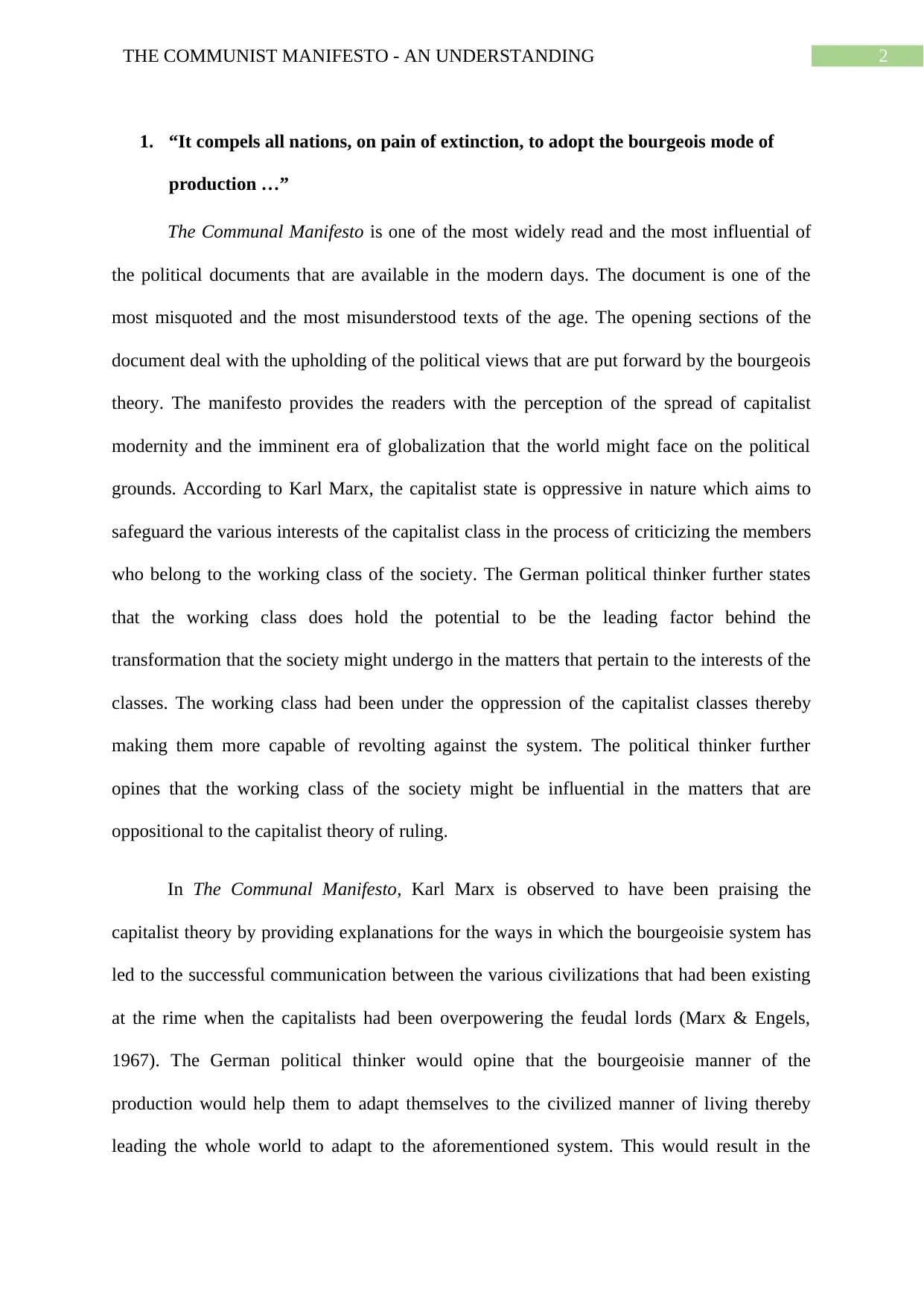
2THE COMMUNIST MANIFESTO - AN UNDERSTANDING
1. “It compels all nations, on pain of extinction, to adopt the bourgeois mode of
production …”
The Communal Manifesto is one of the most widely read and the most influential of
the political documents that are available in the modern days. The document is one of the
most misquoted and the most misunderstood texts of the age. The opening sections of the
document deal with the upholding of the political views that are put forward by the bourgeois
theory. The manifesto provides the readers with the perception of the spread of capitalist
modernity and the imminent era of globalization that the world might face on the political
grounds. According to Karl Marx, the capitalist state is oppressive in nature which aims to
safeguard the various interests of the capitalist class in the process of criticizing the members
who belong to the working class of the society. The German political thinker further states
that the working class does hold the potential to be the leading factor behind the
transformation that the society might undergo in the matters that pertain to the interests of the
classes. The working class had been under the oppression of the capitalist classes thereby
making them more capable of revolting against the system. The political thinker further
opines that the working class of the society might be influential in the matters that are
oppositional to the capitalist theory of ruling.
In The Communal Manifesto, Karl Marx is observed to have been praising the
capitalist theory by providing explanations for the ways in which the bourgeoisie system has
led to the successful communication between the various civilizations that had been existing
at the rime when the capitalists had been overpowering the feudal lords (Marx & Engels,
1967). The German political thinker would opine that the bourgeoisie manner of the
production would help them to adapt themselves to the civilized manner of living thereby
leading the whole world to adapt to the aforementioned system. This would result in the
1. “It compels all nations, on pain of extinction, to adopt the bourgeois mode of
production …”
The Communal Manifesto is one of the most widely read and the most influential of
the political documents that are available in the modern days. The document is one of the
most misquoted and the most misunderstood texts of the age. The opening sections of the
document deal with the upholding of the political views that are put forward by the bourgeois
theory. The manifesto provides the readers with the perception of the spread of capitalist
modernity and the imminent era of globalization that the world might face on the political
grounds. According to Karl Marx, the capitalist state is oppressive in nature which aims to
safeguard the various interests of the capitalist class in the process of criticizing the members
who belong to the working class of the society. The German political thinker further states
that the working class does hold the potential to be the leading factor behind the
transformation that the society might undergo in the matters that pertain to the interests of the
classes. The working class had been under the oppression of the capitalist classes thereby
making them more capable of revolting against the system. The political thinker further
opines that the working class of the society might be influential in the matters that are
oppositional to the capitalist theory of ruling.
In The Communal Manifesto, Karl Marx is observed to have been praising the
capitalist theory by providing explanations for the ways in which the bourgeoisie system has
led to the successful communication between the various civilizations that had been existing
at the rime when the capitalists had been overpowering the feudal lords (Marx & Engels,
1967). The German political thinker would opine that the bourgeoisie manner of the
production would help them to adapt themselves to the civilized manner of living thereby
leading the whole world to adapt to the aforementioned system. This would result in the
⊘ This is a preview!⊘
Do you want full access?
Subscribe today to unlock all pages.

Trusted by 1+ million students worldwide
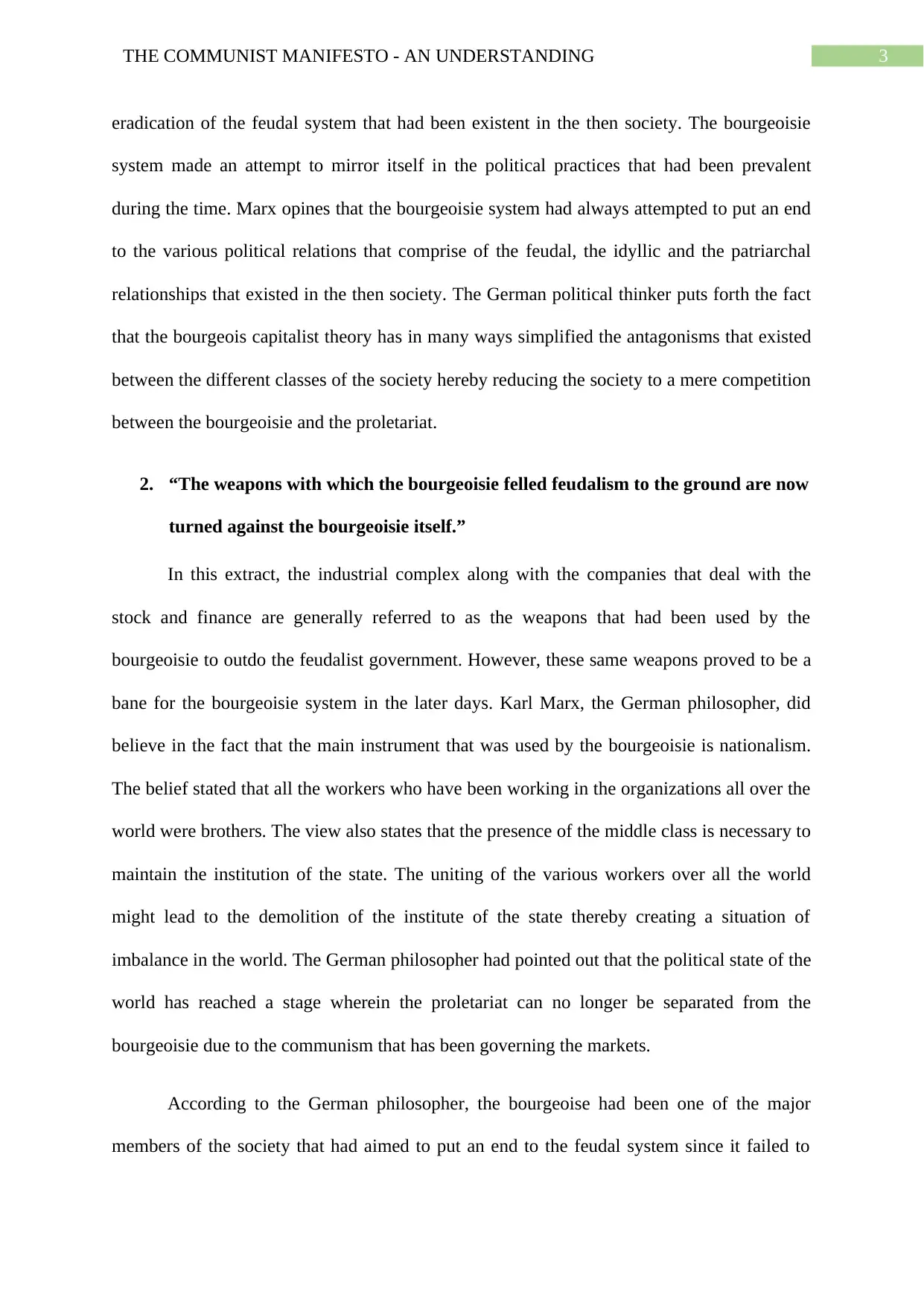
3THE COMMUNIST MANIFESTO - AN UNDERSTANDING
eradication of the feudal system that had been existent in the then society. The bourgeoisie
system made an attempt to mirror itself in the political practices that had been prevalent
during the time. Marx opines that the bourgeoisie system had always attempted to put an end
to the various political relations that comprise of the feudal, the idyllic and the patriarchal
relationships that existed in the then society. The German political thinker puts forth the fact
that the bourgeois capitalist theory has in many ways simplified the antagonisms that existed
between the different classes of the society hereby reducing the society to a mere competition
between the bourgeoisie and the proletariat.
2. “The weapons with which the bourgeoisie felled feudalism to the ground are now
turned against the bourgeoisie itself.”
In this extract, the industrial complex along with the companies that deal with the
stock and finance are generally referred to as the weapons that had been used by the
bourgeoisie to outdo the feudalist government. However, these same weapons proved to be a
bane for the bourgeoisie system in the later days. Karl Marx, the German philosopher, did
believe in the fact that the main instrument that was used by the bourgeoisie is nationalism.
The belief stated that all the workers who have been working in the organizations all over the
world were brothers. The view also states that the presence of the middle class is necessary to
maintain the institution of the state. The uniting of the various workers over all the world
might lead to the demolition of the institute of the state thereby creating a situation of
imbalance in the world. The German philosopher had pointed out that the political state of the
world has reached a stage wherein the proletariat can no longer be separated from the
bourgeoisie due to the communism that has been governing the markets.
According to the German philosopher, the bourgeoise had been one of the major
members of the society that had aimed to put an end to the feudal system since it failed to
eradication of the feudal system that had been existent in the then society. The bourgeoisie
system made an attempt to mirror itself in the political practices that had been prevalent
during the time. Marx opines that the bourgeoisie system had always attempted to put an end
to the various political relations that comprise of the feudal, the idyllic and the patriarchal
relationships that existed in the then society. The German political thinker puts forth the fact
that the bourgeois capitalist theory has in many ways simplified the antagonisms that existed
between the different classes of the society hereby reducing the society to a mere competition
between the bourgeoisie and the proletariat.
2. “The weapons with which the bourgeoisie felled feudalism to the ground are now
turned against the bourgeoisie itself.”
In this extract, the industrial complex along with the companies that deal with the
stock and finance are generally referred to as the weapons that had been used by the
bourgeoisie to outdo the feudalist government. However, these same weapons proved to be a
bane for the bourgeoisie system in the later days. Karl Marx, the German philosopher, did
believe in the fact that the main instrument that was used by the bourgeoisie is nationalism.
The belief stated that all the workers who have been working in the organizations all over the
world were brothers. The view also states that the presence of the middle class is necessary to
maintain the institution of the state. The uniting of the various workers over all the world
might lead to the demolition of the institute of the state thereby creating a situation of
imbalance in the world. The German philosopher had pointed out that the political state of the
world has reached a stage wherein the proletariat can no longer be separated from the
bourgeoisie due to the communism that has been governing the markets.
According to the German philosopher, the bourgeoise had been one of the major
members of the society that had aimed to put an end to the feudal system since it failed to
Paraphrase This Document
Need a fresh take? Get an instant paraphrase of this document with our AI Paraphraser
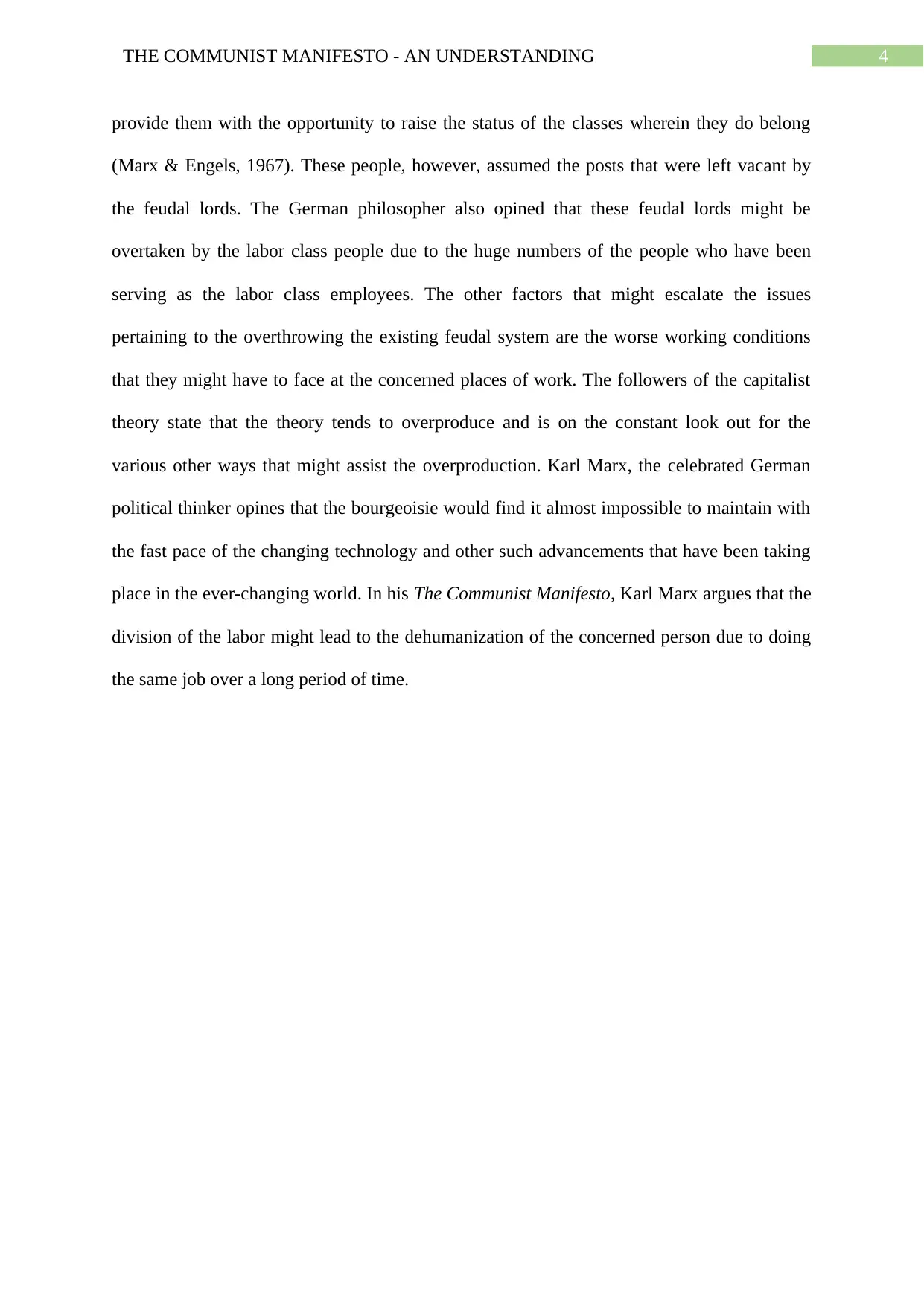
4THE COMMUNIST MANIFESTO - AN UNDERSTANDING
provide them with the opportunity to raise the status of the classes wherein they do belong
(Marx & Engels, 1967). These people, however, assumed the posts that were left vacant by
the feudal lords. The German philosopher also opined that these feudal lords might be
overtaken by the labor class people due to the huge numbers of the people who have been
serving as the labor class employees. The other factors that might escalate the issues
pertaining to the overthrowing the existing feudal system are the worse working conditions
that they might have to face at the concerned places of work. The followers of the capitalist
theory state that the theory tends to overproduce and is on the constant look out for the
various other ways that might assist the overproduction. Karl Marx, the celebrated German
political thinker opines that the bourgeoisie would find it almost impossible to maintain with
the fast pace of the changing technology and other such advancements that have been taking
place in the ever-changing world. In his The Communist Manifesto, Karl Marx argues that the
division of the labor might lead to the dehumanization of the concerned person due to doing
the same job over a long period of time.
provide them with the opportunity to raise the status of the classes wherein they do belong
(Marx & Engels, 1967). These people, however, assumed the posts that were left vacant by
the feudal lords. The German philosopher also opined that these feudal lords might be
overtaken by the labor class people due to the huge numbers of the people who have been
serving as the labor class employees. The other factors that might escalate the issues
pertaining to the overthrowing the existing feudal system are the worse working conditions
that they might have to face at the concerned places of work. The followers of the capitalist
theory state that the theory tends to overproduce and is on the constant look out for the
various other ways that might assist the overproduction. Karl Marx, the celebrated German
political thinker opines that the bourgeoisie would find it almost impossible to maintain with
the fast pace of the changing technology and other such advancements that have been taking
place in the ever-changing world. In his The Communist Manifesto, Karl Marx argues that the
division of the labor might lead to the dehumanization of the concerned person due to doing
the same job over a long period of time.
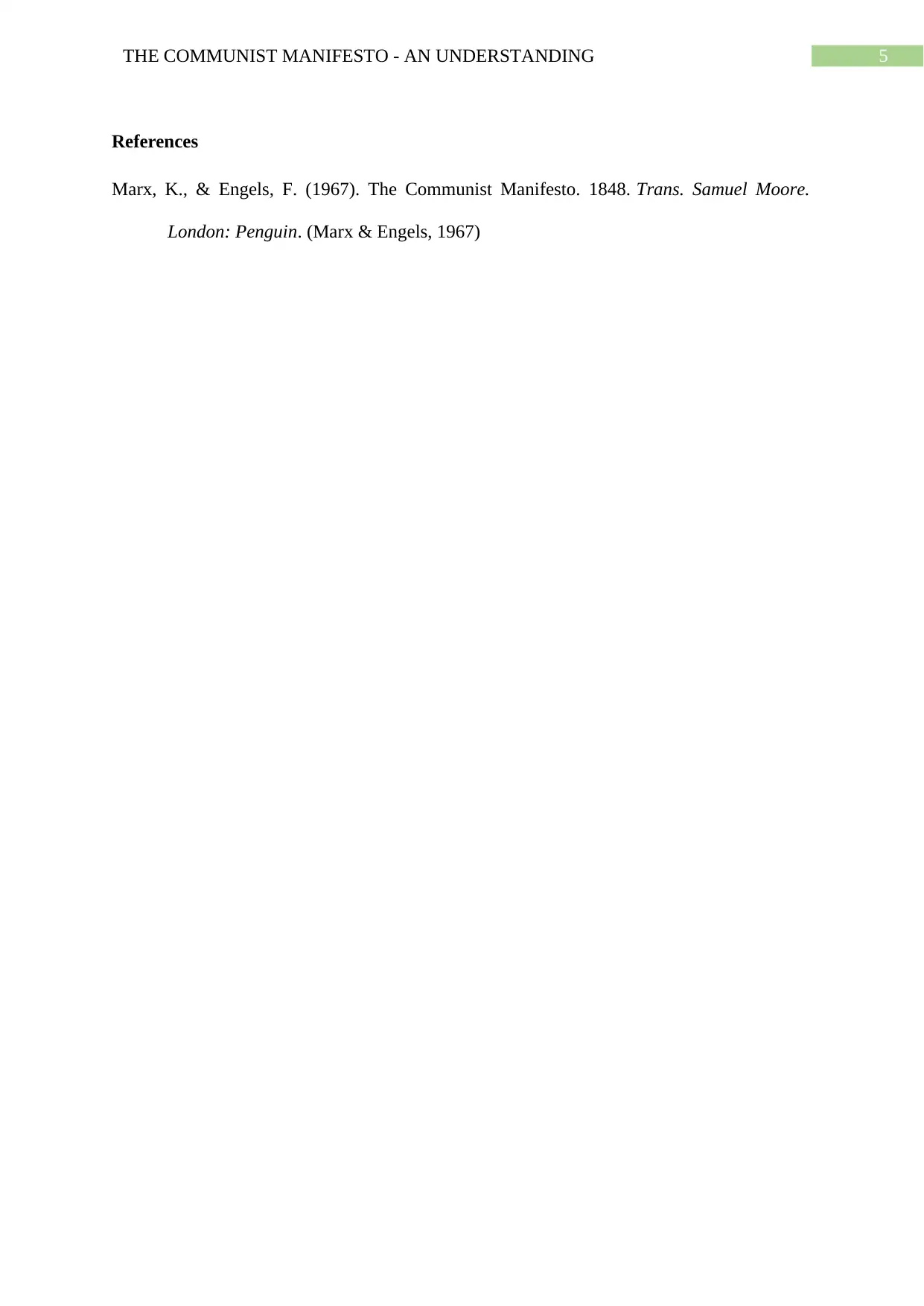
5THE COMMUNIST MANIFESTO - AN UNDERSTANDING
References
Marx, K., & Engels, F. (1967). The Communist Manifesto. 1848. Trans. Samuel Moore.
London: Penguin. (Marx & Engels, 1967)
References
Marx, K., & Engels, F. (1967). The Communist Manifesto. 1848. Trans. Samuel Moore.
London: Penguin. (Marx & Engels, 1967)
⊘ This is a preview!⊘
Do you want full access?
Subscribe today to unlock all pages.

Trusted by 1+ million students worldwide
1 out of 6
Related Documents
Your All-in-One AI-Powered Toolkit for Academic Success.
+13062052269
info@desklib.com
Available 24*7 on WhatsApp / Email
![[object Object]](/_next/static/media/star-bottom.7253800d.svg)
Unlock your academic potential
Copyright © 2020–2025 A2Z Services. All Rights Reserved. Developed and managed by ZUCOL.





